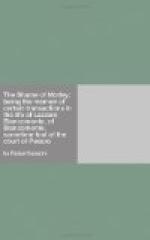I scorned the wine they proffered me ere I departed. That last night’s draught had quenched my thirst for ever of such grape-juice as it was theirs to tender. I urged the taverner to hasten with my horse, and stood waiting in the squalid common-room, my mind divided ’twixt impatience to resume the road to Pesaro and fresh speculations upon the means I was to adopt to enter it and yet save my neck—for this was now become an obsessing problem.
As I stood waiting, there broke upon my ears the sound of an approaching cavalcade: the noise of voices and the soft fall of hoofs upon the thick snow carpet. The company halted at the door, and a loud, gruff voice was raised to cry:
“Locandiere! Afoot, sluggard!”
I stepped to the door, with very natural curiosity, a company of four mounted men escorting a mule-litter, the curtains of which were drawn so that nothing might be seen of him or her that rode within. Grooms were those four, as all the world might see at the first glance, and the livery they wore was that of the noble House of Santafior—the holy white flower of the quince being embroidered on the breast of their gabardines.
They bore upon them such signs of hard and hasty travelling that it was soon guessed they had spent the night in the saddle. Their horses were in a foam of sweat; and the men themselves were splashed with mud from foot to cap.
Even as I was going forward to regard them the taverner appeared, leading my horse by the bridle. Now at an inn the traveller that arrives is ever of more importance than he that departs. At sight of those horsemen, the taverner forgot my impatience, for he paused to bow in welcome to the one that seemed the leader.
“Most Magnificent,” said he to that liveried hind, “command me.”
“We need a guide,” the fellow answered with an ill grace.
“A guide, Illustrious?” quoth the host. “A guide?”
“I said a guide, fool,” answered him the groom. “Heard you never of such animals? We need a man who knows the hills, to lead us by the shortest road to Cagli.”
The taverner shook his grey head stupidly. He bowed again until I fancied I could hear the creak of his old joints.
“Here be no guides, Magnificent,” he deplored. “Perhaps at Gualdo—”
“Animal,” was the retort—for true courtesy commend me to a lacquey!—“it is not our wish to pursue the road as far as Gualdo, else had we not stopped at this kennel of yours.”
I scarce know what it can have been that moved me to act as I then did, for, in the truth, the manner of that rascal of a groom was little prepossessing, and his master, I doubted, could be little better that he left the fellow to hector it thus over that wretched tavern oaf. But I stepped forward.
“Did you say that you were journeying to Cagli?” questioned I.
He eyed me sourly, suspicion writ athwart his round, ill-favoured face, But my motley was hidden from his sight. My cloak, my hat and boots allowed naught of my true condition to appear, and might as well have covered a lordling as a jester. Yet his inveterate surliness the rascal could not wholly conquer.




